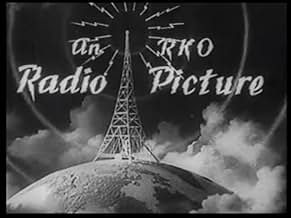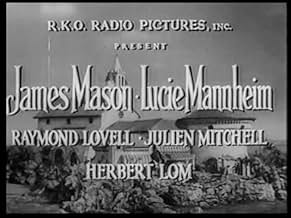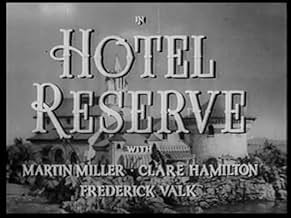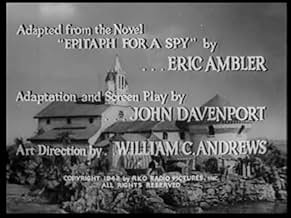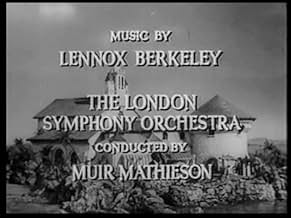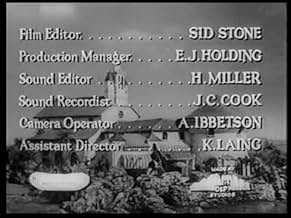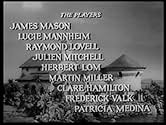Ajouter une intrigue dans votre langueA hunt for a spy, in an hotel in the South of France just before World War Two.A hunt for a spy, in an hotel in the South of France just before World War Two.A hunt for a spy, in an hotel in the South of France just before World War Two.
- Réalisation
- Scénario
- Casting principal
Joseph Almas
- Albert, the waiter
- (as Josef Almas)
Hella Kürty
- Hilda Vogel
- (as Hella Kurty)
Avis à la une
"Hotel Reserve", a spy movie from the '40s, is thoroughly enjoyable, though it does have its faults.
The story deals with a vacationing medical student (a very young and good-looking James Mason) who is mistaken for an enemy spy by the French police. Realizing he is innocent, the police department send him back to his hotel with the mission of finding out which of the guests is really the spy.
Though a good film, the supporting cast is weak. Mr Mason is at his usual elegant standard, and I must say that I love the guy playing Duclos, but many of the other parts could have been better filled. I agree that it would have been interesting to see what Hitch would have done with it, but Alfred or no Alfred, "Hotel Reserve" is still very much worth seeing.
The story deals with a vacationing medical student (a very young and good-looking James Mason) who is mistaken for an enemy spy by the French police. Realizing he is innocent, the police department send him back to his hotel with the mission of finding out which of the guests is really the spy.
Though a good film, the supporting cast is weak. Mr Mason is at his usual elegant standard, and I must say that I love the guy playing Duclos, but many of the other parts could have been better filled. I agree that it would have been interesting to see what Hitch would have done with it, but Alfred or no Alfred, "Hotel Reserve" is still very much worth seeing.
One wonders what this movie would have become if Hitchcock had gotten his hands on it. Would he have revved up the plot, tightened up the script, recast some of the characters, put in a highway chase over the countryside interrupted by sheep, added a more appealing female interest for Mason? The climb up to the roof at the end, the strong lighting and direct closeups, the art and photographic direction(seemingly uncredited to one of the directors),as well as the music score and the general "look" of the film, not to mention James Mason's compelling presence all had the ingredients for a potential Hitchcockian thriller, but something is missing here. The plot's not that complicated (certainly not like "The Lady Vanishes") and there seems not to be enough risk or sense of danger (certainly not like "The 39 Steps")to Mason's life, although there is suspense and surprise along the way. One big weakness is the supporting cast. The young lady's character (can't even remember her name) isn't developed enough, nor does she have sufficient charm or sex appeal, as a Hitchcockian heroine would.
Still one watches it for Mason, before he has developed any overt mannerisms or been sadly type-cast as a villain. He seems to have made a number of these not-quite-up-to-snuff pictures in his career. Was he hard up? why didn't Hitchcock cast him and why didn't he ever accept a Powell & Pressburger offer? His presence on any number of these "grade-b" films, including the brief appearance in "Madame Bovary" (with Jenifer Jones), for example, or in the disappointing "Mayerling," adds a sense of gravitas to any of the proceedings in which he appeared, but the scripts and directors fail him, if not the cast.
Fortunately, he can be remembered for his appearance as Captain Nemo in "Twenty Thousand Leagues under the Sea," and Sir Randolph Nettleby in "Shooting Party," both of which tapped his natural dignity and aristocratic bearing and surrounded him with a worthy cast. See those for Mason at his best.
Of four stars****, two and a half.
Still one watches it for Mason, before he has developed any overt mannerisms or been sadly type-cast as a villain. He seems to have made a number of these not-quite-up-to-snuff pictures in his career. Was he hard up? why didn't Hitchcock cast him and why didn't he ever accept a Powell & Pressburger offer? His presence on any number of these "grade-b" films, including the brief appearance in "Madame Bovary" (with Jenifer Jones), for example, or in the disappointing "Mayerling," adds a sense of gravitas to any of the proceedings in which he appeared, but the scripts and directors fail him, if not the cast.
Fortunately, he can be remembered for his appearance as Captain Nemo in "Twenty Thousand Leagues under the Sea," and Sir Randolph Nettleby in "Shooting Party," both of which tapped his natural dignity and aristocratic bearing and surrounded him with a worthy cast. See those for Mason at his best.
Of four stars****, two and a half.
Looks like RKO had a British productions unit that would explain the non-American cast, and perhaps also why the unusual number of three directors was used on a black and white programmer. Some of the sets are impressive, especially the tower used in the final scene. Also, Frederick Valt impresses as the sinister Schimler, along with a sparkling Clare Hamilton who's a dead ringer for her sister Maureen O'Hara and apparently just as talented; yet, this is her only screen appearance and I'm curious why.
Nonetheless, in my little book, the movie disappoints, mainly because it's set up as a suspense film, yet doesn't really manage much suspense. We're introduced to each of ten suspects, one of which is a Nazi agent. Ordinarily, the narrative would develop each so that the audience could sort through them, thereby heightening the suspense. That doesn't happen here. Instead, much time is given over to two unnecessarily long scenes with the intelligence chief and repeated episodes with the pompous Duclos who's really more annoying than amusing. In fact, the narrative meanders to the extent few suspects are developed, and when the agent is revealed, it's done in highly unsuspenseful, pedestrian fashion. The various parts simply don't gel, and I suspect it's due not only to a muddled adaptation of the Ambler novel, but also to each director having his own preoccupations.
It's also a different James Mason. Not the dark, brooding presence he is so good at. Instead, he's rather sunny and serene, even in tight spots. Frankly, his performance here could have been equaled by a dozen lesser actors and leading men. The movie does have its moments, particularly the seaside setting with the moody resort hotel. That, plus the premise of ten suspects, had me thinking of the 1945 Rene Clair mystery classic And Then There Were None. Unfortunately, the result here likely demonstrates that old adage about too many cooks.
Nonetheless, in my little book, the movie disappoints, mainly because it's set up as a suspense film, yet doesn't really manage much suspense. We're introduced to each of ten suspects, one of which is a Nazi agent. Ordinarily, the narrative would develop each so that the audience could sort through them, thereby heightening the suspense. That doesn't happen here. Instead, much time is given over to two unnecessarily long scenes with the intelligence chief and repeated episodes with the pompous Duclos who's really more annoying than amusing. In fact, the narrative meanders to the extent few suspects are developed, and when the agent is revealed, it's done in highly unsuspenseful, pedestrian fashion. The various parts simply don't gel, and I suspect it's due not only to a muddled adaptation of the Ambler novel, but also to each director having his own preoccupations.
It's also a different James Mason. Not the dark, brooding presence he is so good at. Instead, he's rather sunny and serene, even in tight spots. Frankly, his performance here could have been equaled by a dozen lesser actors and leading men. The movie does have its moments, particularly the seaside setting with the moody resort hotel. That, plus the premise of ten suspects, had me thinking of the 1945 Rene Clair mystery classic And Then There Were None. Unfortunately, the result here likely demonstrates that old adage about too many cooks.
Propaganda plays a key role in modern warfare, so between 1939 and 1945 the British cinema made an important contribution towards our war effort. Although "Hotel Reserve" is set during the pre-war period, it can nevertheless be regarded as a propaganda film as it is a spy thriller in which the Nazis are the villains and the good guys, apart from the French intelligence services, are Austrian and German anti-Nazi émigrés.
In the summer of 1938 Peter Vadassy, a young Austrian medical student studying in France, is on holiday at the Hotel Reserve in the south of France. Being a keen photographer, he takes a number of photographs and then takes the negatives to the local pharmacy to have them developed. When he tries to collect the prints, however, he is arrested by French intelligence. It turns out that some of the photographs are of the French naval base at Toulon. Michel Beguin, the intelligence officer who interrogates Peter, realises that he is not a spy, but nevertheless sends him back to the hotel with instructions to find the real culprit, under threat of expulsion from France. This would mean Peter's having to abandon his medical studies and, as he is opposed to the Nazi regime, has no desire to return to Austria. (Contrary to what is argued in the "goofs" section, the year must be 1938, not 1937).
As others have pointed out, the plot of "Hotel Reserve"- an innocent man caught up in international espionage- could be that of an Alfred Hitchcock film. It was one he used in, among others, the two versions of "The Man who Knew Too Much" and "North by North-West". (James Mason, who appears as Peter here, also appeared in "North by North-West", his only collaboration with Hitchcock, although in that case as the film's villain rather than its hero). By 1944, however, Hitch had left Britain for Hollywood, so was not available. The film was both directed and produced by a trio: Lance Comfort, Mutz Greenbaum (aka Max Greene) and Victor Hanbury.
It is interesting to speculate what the film might have looked like had Hitchcock directed it. There would probably have been a more prominent leading role for Peter's love-interest Mary, who would doubtless have been played by a blonde. Hitch would also probably have maintained a greater level of suspense throughout; in the film as it exists the tension tends to slacken in the middle, although there is a very tense (and very Hitchcockian) final scene involving a rooftop cliff-hanger. This is a decent, but not outstanding, spy thriller, and mason made many better films in his long and distinguished career, but in 1944 it was doubtless appreciated. 6/10.
In the summer of 1938 Peter Vadassy, a young Austrian medical student studying in France, is on holiday at the Hotel Reserve in the south of France. Being a keen photographer, he takes a number of photographs and then takes the negatives to the local pharmacy to have them developed. When he tries to collect the prints, however, he is arrested by French intelligence. It turns out that some of the photographs are of the French naval base at Toulon. Michel Beguin, the intelligence officer who interrogates Peter, realises that he is not a spy, but nevertheless sends him back to the hotel with instructions to find the real culprit, under threat of expulsion from France. This would mean Peter's having to abandon his medical studies and, as he is opposed to the Nazi regime, has no desire to return to Austria. (Contrary to what is argued in the "goofs" section, the year must be 1938, not 1937).
As others have pointed out, the plot of "Hotel Reserve"- an innocent man caught up in international espionage- could be that of an Alfred Hitchcock film. It was one he used in, among others, the two versions of "The Man who Knew Too Much" and "North by North-West". (James Mason, who appears as Peter here, also appeared in "North by North-West", his only collaboration with Hitchcock, although in that case as the film's villain rather than its hero). By 1944, however, Hitch had left Britain for Hollywood, so was not available. The film was both directed and produced by a trio: Lance Comfort, Mutz Greenbaum (aka Max Greene) and Victor Hanbury.
It is interesting to speculate what the film might have looked like had Hitchcock directed it. There would probably have been a more prominent leading role for Peter's love-interest Mary, who would doubtless have been played by a blonde. Hitch would also probably have maintained a greater level of suspense throughout; in the film as it exists the tension tends to slacken in the middle, although there is a very tense (and very Hitchcockian) final scene involving a rooftop cliff-hanger. This is a decent, but not outstanding, spy thriller, and mason made many better films in his long and distinguished career, but in 1944 it was doubtless appreciated. 6/10.
I enjoyed this. It had an interesting plot, and yes, Hitchcock would probably have beefed it up and done it better, and some of the characters are clichés, but not a bad way to spend a rainy afternoon.
For a film over 75 years old it has stood the test of time quite well. It was a far better viewing experience than many current films I have watched recently.
For a film over 75 years old it has stood the test of time quite well. It was a far better viewing experience than many current films I have watched recently.
Le saviez-vous
- AnecdotesClare Hamilton, who plays Mary Skelton, was the sister of Maureen O' Hara. This would be her one and only screen appearance.
- GaffesAll online summaries of the plot identify the year being 1938, but days and dates seen on the calendar in Peter's room are only correct if the year is 1937. Whoever wrote the original synopses for this film apparently knows no French.
- Citations
[last lines]
Mme Suzanne Koch: Let them be happy, while they can. There are so few summers. There's so little time.
- Crédits fousOpening credits prologue: A holiday...in France...before the war...yet even then the plane-trees and cypresses of the South cast shadows in the sun.
It happened in August 1938 ...
- ConnexionsRemade as Epitaph for a Spy (1953)
Meilleurs choix
Connectez-vous pour évaluer et suivre la liste de favoris afin de recevoir des recommandations personnalisées
Détails
- Date de sortie
- Pays d’origine
- Langue
- Aussi connu sous le nom de
- El espía del hotel
- Lieux de tournage
- Société de production
- Voir plus de crédits d'entreprise sur IMDbPro
- Durée1 heure 30 minutes
- Couleur
- Rapport de forme
- 1.37 : 1
Contribuer à cette page
Suggérer une modification ou ajouter du contenu manquant

Lacune principale
By what name was Hôtel Réserve (1944) officially released in India in English?
Répondre
